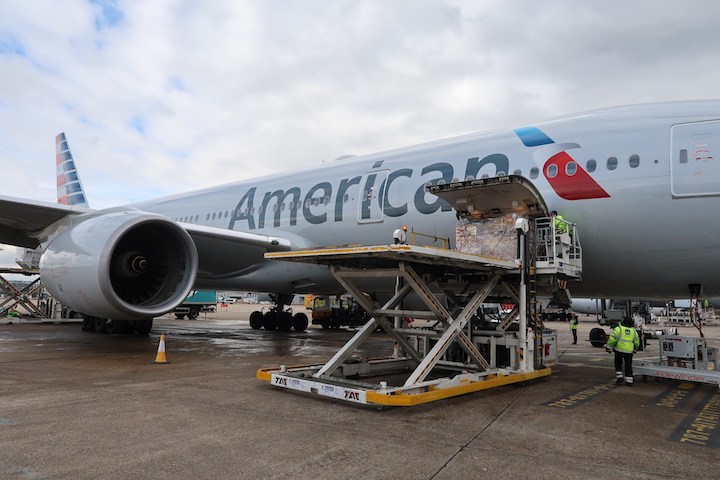Virus spurs American Air’s first cargo-only flights in 36 years
American Airlines Group Inc. is shifting some of its biggest idled jets to ferry just cargo—the carrier’s first flights without passengers in nearly four decades.
The Boeing Co. 777-300s will fly medical supplies, military mail, e-commerce packages and high-demand office equipment as more people work from home, the airline said in a statement. The wide-body flights begin Friday, with two round trips over four days between Frankfurt and the airline’s home base at Dallas-Fort Worth airport.

They will be American’s first scheduled cargo-only flights since 1984, when the airline retired the last of its Boeing 747 freighters.
The shift shows one way the word’s biggest airline by traffic is attempting to bolster sinking sales as the new coronavirus spreads across the globe and governments restrict travel. The U.S. on Thursday told all Americans not to travel abroad. Major U.S. carriers are idling at least 1,000 aircraft in response to the collapse in demand.
“Challenging times call for creative solutions,” Rick Elieson, American’s cargo president, said in the late Thursday statement.
Chief Executive Officer Doug Parker and the airline’s unions urged the federal government to quickly approve a $58 billion aid package for the industry. Without passengers, their letter said, American and other carriers can’t afford to fly.
“And without airplanes to fly, mechanics, flight attendants, pilots, dispatchers, fleet and airport workers, just to name a few, will lose the ability to provide for their families,” the letter said.
American will park 450 planes, or 29% of its fleet, as it cuts international capacity 75% and domestic, 30%. It has canceled 55,000 flights in April alone. The truncated schedule will idle about 130 of its 150 wide-body aircraft.
The 777-300 can carry more than 100,000 pounds of cargo on large pallets. American also continues to fly cargo in the bellies of its passenger planes.
The airline’s shares rose 5.4% to $10.85 at 9:55 a.m. Friday in New York. American plunged 12% Thursday, leaving the stock down 64% for the year.
Similar Stories

CPaT partners with Wizz Air, Europe’s leading ultra-low-cost airline, to enhance aviation training
View Article
Air Transat takes off to Tulum from Montreal and Quebec City
View Article
Air France KLM Martinair Cargo achieves record online sales and accelerates commercial transformation
View Article[Freightos Weekly Update] Frontloading continues to put pressure on transpacific rates
Transpacific ocean rates increased slightly last week and are about 15% higher than at the start of December as frontloading ahead of expected tariffs is keeping vessels full.
View Article
American Airlines becomes only carrier to fly nonstop between Washington, D.C., and San Antonio
View ArticleOpen Skies agreement with the Dominican Republic enters into force
The U.S.-Dominican Republic Air Transport Agreement entered into force on December 19. This bilateral agreement establishes a modern civil aviation relationship with the Dominican Republic consistent with U.S. Open Skies…
View ArticleGet the most up-to-date trending news!
SubscribeIndustry updates and weekly newsletter direct to your inbox!





